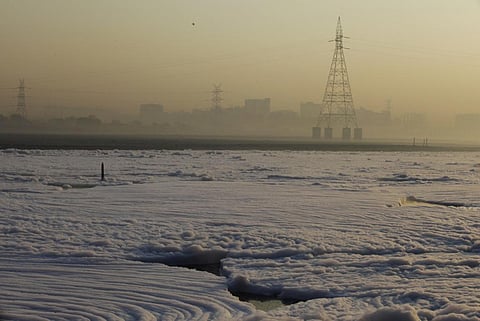Why we must fix toxic chemical pollution to safeguard our planet and health
Managed responsibly, chemicals offer immense contributions to our progress. They underpin critical sectors, from agriculture to healthcare, and drive technological breakthroughs that have transformed industries. They are the building blocks of our modern world, enabling us to achieve feats previously unimaginable. But the story is far from one-sided.
The cost of neglecting proper chemical management is increasingly evident. Workers around the world are facing a global health crisis due to occupational exposure to toxic chemicals.
More than one billion workers every year are exposed to hazardous substances — pollutants, dusts, vapours and fumes — in their working environments, according to a global review in 2021 by the International Labour Organization. Their families face the burden from non-fatal injuries resulting in disability and other chronic diseases, which in many cases remain invisible.
Studies have shown that there is a significant association between occupational and residential exposure to pesticides and adverse health outcomes, including cancers and neurological, immunological, and reproductive effects.
The environment, too, bears the brunt of our negligence. Pervasive chemical pollution has led to the degradation of ecosystems, loss of biodiversity and disruption of delicate ecological balances. Over 75 per cent of terrestrial ecosystems and 40 per cent of marine ecosystems have been significantly altered by human activity, including chemical pollution, highlighted a 2020 report by the Intergovernmental Science-Policy Platform on Biodiversity and Ecosystem Services.
Behind every statistic lies a personal tragedy — a worker exposed to toxic fumes, a child affected by water contamination, a community grappling with the aftermath of environmental degradation.
Yet, these tragedies also hold the key to transformation. By embracing meticulous planning, comprehensive risk assessments, and stringent regulatory frameworks, we can stem the tide of avoidable catastrophes. We need transformative actions that address the root causes and shift market demand, coupled with supportive and enabling measures.
History is replete with instances of proactive chemical management averting disaster and fostering progress. From the phasing out of ozone-depleting substances to the reduction of industrial accidents through vigilant monitoring, the successes of responsible chemical governance are testament to human ingenuity and foresight. These victories underscore that our destiny is not determined by the inevitability of tragedy, but by our commitment to change.
As policymakers and chemical experts from across the globe gather in Bonn, Germany from September 25-29, 2023 for the Fifth International Conference on Chemicals Management (ICCM5), they must strengthen a global agreement that prioritises accountability for the pollution from the production, use and disposal of chemicals and the products produced that contain chemicals. However, the imperative for responsible chemical management extends beyond government regulations — it must become an inherent part of industry practices.
The chemical industry, with its profound impact on global economies and daily life, has a pivotal role to play in shaping a safer and more sustainable future through the adoption of constructive practices and the promotion of safer alternatives in chemical production. By embracing innovation and investing in research and development, the industry can pave the way for greener solutions that minimise the inherent risks associated with traditional chemical processes.
The importance of green and sustainable chemistry cannot be overstated; it represents a paradigm shift towards designing chemical processes that are not only efficient and effective but also environmentally benign.
Through the incorporation of principles such as atom economy, reduction of hazardous substances and energy efficiency, the chemical industry can significantly reduce its ecological footprint while delivering products that benefit both society and the environment.
By championing initiatives that prioritise safety, health and environmental preservation, the chemical industry can not only prevent accidents and mitigate adverse impacts but also lead the charge in establishing a harmonious relationship between scientific progress and planetary wellbeing. This too, for the industries that use chemicals in their products, value chain actors across the agricultural, buildings and construction, pharmaceutical, electronics, and textiles sectors and related value chains.
ICCM5 offers a unique opportunity for governments, industries and the civil society to come together and create a future free from the multiple repercussions of chemical mismanagement.
The path forward demands the collaboration of governments, industries and individuals in a shared mission to prioritise safety, health and environmental stewardship. By championing change at the company level, and policy and regulatory change at the government level, we can usher in an era where preventable deaths, injuries, and environmental degradation are relegated to history.
The power to prevent lies within our grasp — let's grasp it with determination and the resolve to protect our world for generations to come.
Sheila Aggarwal-Khan is the Director of UNEP’s Industry and Economy Division.
Views expressed are the author’s own and don’t necessarily reflect those of Down To Earth.


